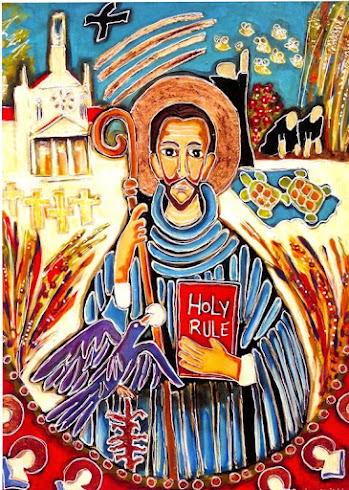Connie Kittok
Thursday is the feast of our patron and founder, ST. BENEDICT. In the past 20 years he
has become popular in many circles. We ask ourselves why is Saint Benedict
so important for us today? Certainly our own country and the whole world needs a
patron to get us out of the moral, political and human confusion that is wreaking
havoc across the globe, from war, wretched politics, poverty, crime, and plain
bad decisions in all areas of our culture.
“Messenger of peace, molder of union, magister of civilization, and above all herald of the religion of Christ and founder of monastic life in the West: these are the proper titles of exaltation given to St. Benedict, Abbot.”
In 1980 letter sent to the Benedictines on the 1500th anniversary of monastic life, St. John Paul II wrote:
Man’s
face is often wet with tears impelling him to pray, but these tears do not
always spring from sincere compunction or excessive joy. For often tears of
sorrow and disturbance ow from those whose human dignity is disregarded,
those who cannot achieve what they justly desire, and who cannot do the work
that suits their needs and talents.
St
Benedict lived in a civil society deformed by injustices. The human person
frequently counted for nothing and was treated as a criminal. In a social
structure drawn up in orders, the most wretched were segregated and reduced to
slavery. The poor grew poorer, while the rich grew richer and richer. Yet this
remarkable man willed to found the monastic community on the prescriptions of
the Gospel. He restored man to his integral condition, no matter what social
order or rank he came from. He provided for the needs of each according to the
norms of a wise distributive justice. He assigned significant duties to
individuals, duties which cohered aptly with other duties. He considered the
conditions of the weak, but left no room for easy laziness. He allowed space
for the cleverness of others lest they feel hemmed in, or rather, so that they
might be stimulated to give their best. Thus he removed the pretext of a light
and sometimes justified murmuring, and brought about the conditions of true
peace....
Unless Christ endows human action with a constant lofty meaning,
the worker becomes the slave –a special kind of slave unique to modern times–
of profit and industry. On the contrary, Benedict affirms the urgent necessity
of giving a spiritual character to work, enlarging the purpose of human labor
so that it can escape the excessive application of the technical arts and the
excessive greed for what is useful to one’s self."
(Painting: Stephen Whatley- England)


No comments:
Post a Comment